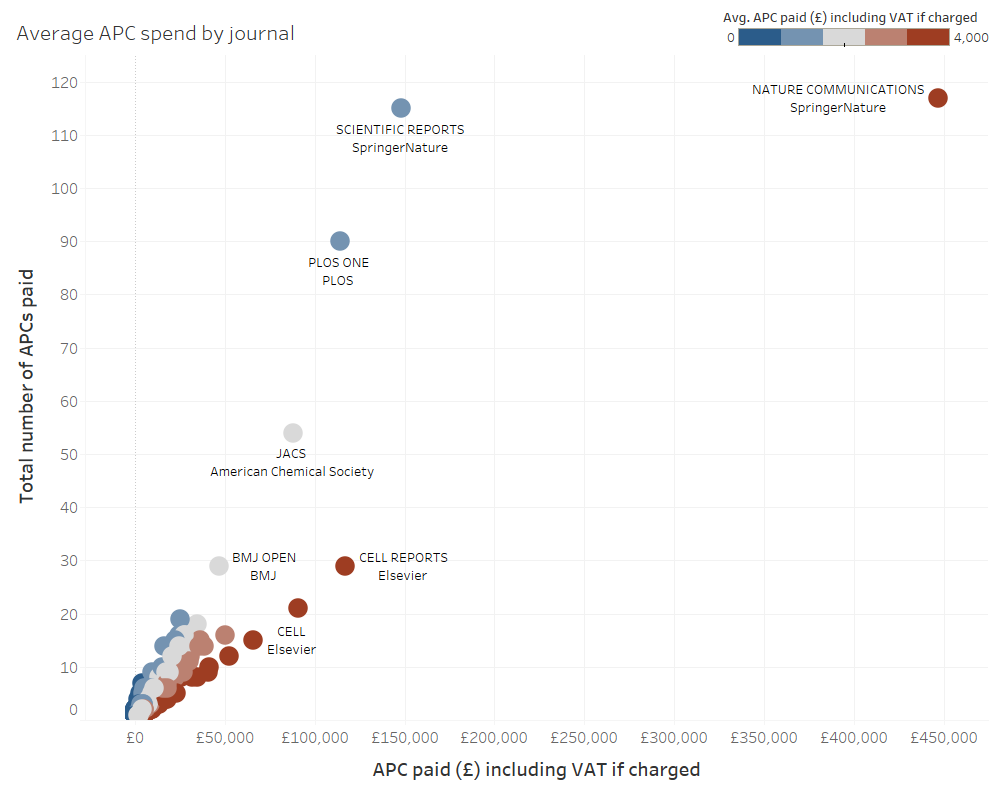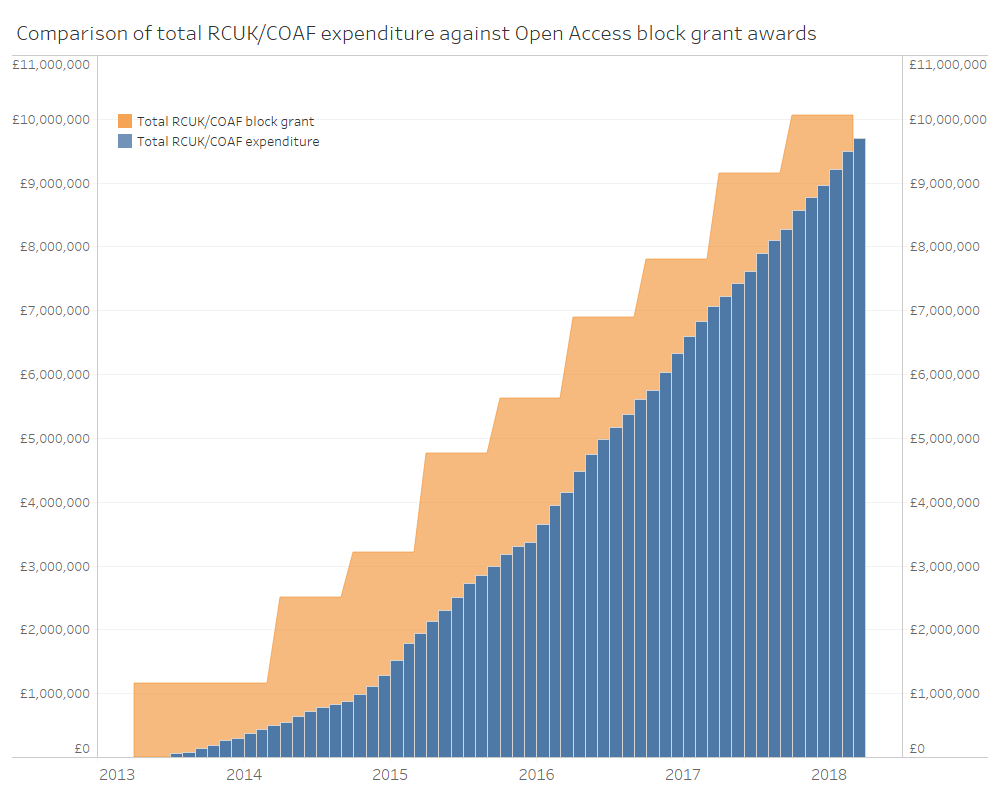Since 2013, the Open Access Team has been helping Cambridge researchers, funded by Research Councils UK (RCUK) and the consortium of biomedical funders which make up the Charity Open Access Fund (COAF), to meet their Open Access obligations. Both RCUK (now part of UKRI) and COAF have Open Access policies which have a preference for ‘gold’, i.e. the published work should be Open Access immediately at the time of publication. Implementing these policies has come at a significant cost. In this time, Cambridge has been awarded just over £10 million from RCUK and COAF to implement their Open Access policies, and the Open Access Team has diligently used this funding to maximum effect.
Figure 1. Comparison of combined RCUK/COAF grant spend and available funds, April 2013 – March 2018.
Initially, expenditure was slow which allowed the Open Access Team to maintain a healthy balance that could guarantee funding for almost any paper which met a few basic requirements. However, since January 2016 expenditure has gradually been catching up on the available funds which has made funding decisions more difficult (specifically Open Access deals tied to multi-year publisher subscriptions). In the first three months of 2018 average monthly expenditure on the RCUK block grant alone exceeded £160,000. We are quickly reaching the point where expenditure will outstrip the available grants.
One technical change which has particularly affected our management of the block grants was RCUK’s decision last year to move away from a direct cash award (which could be rolled over year to year) to a more tightly managed research grant. In the past, carrying over underspend has given us some flexibility in the management of the RCUK funds, whereas the more restrictive style of research grant will mean that any underspend will need to be returned at the end of the grant period, while any overspend cannot be deferred into the next grant period. As we are now dealing with a fixed budget, the Open Access Team will need to ensure that expenditure is kept within the limits of the grant. This is difficult when we have no control over where or when our researchers publish.
Funding from COAF (which is also managed as though it is a research grant) has generally matched our total annual spend quite closely, but the strict grant management rules have caused some problems, especially in the transition period between one grant and another. However, unlike RCUK, the Wellcome Trust will provide supplementary funding in addition to the main COAF award if it is exhausted, and the other COAF partners have similar procedures in place to manage Open Access payments beyond the end of the grant.
Where does it all go?
Most of our expenditure (91%) goes on article processing charges (APCs), as perhaps one might expect, but the block grants are also used to support the staff of the Open Access Team (3%), helpdesk and repository systems (2%), page and colour charges (2%), and publisher memberships (1%) (where this results in a reduced APC). The majority of APCs we’ve paid go towards hybrid journals, which represent approximately 80% of total APC spend.
So let’s take a look at which publishers have received the most funds. We’ve tried to match as much of our raw financial information we have to specific papers, although some of our data is either incomplete or we can’t easily link a payment back to a specific article, particularly if we look back to 2013-2015 when our processes were still developing. Nonetheless, the average APC paid over the last 5 years was £2,291 (inc. 20% VAT), but as can be seen from Table 1, average APCs have been rising year on year at a rate of 7% p.a., significantly higher than inflation. Price increases at this rate are not sustainable in the long term – by 2022 we could be paying on average £3000 per article.
Table 1. Average APC by publication year of article (where known).
| Year of publication | Average APC paid (£) |
| 2013 | £1,794 |
| 2014 | £1,935 |
| 2015 | £2,044 |
| 2017 | £2,187 |
| 2018 | £2,336 |
Elsevier has been by far the largest recipient of block grant funds, receiving 29.4% of all APC expenditure from the RCUK and COAF awards (over £2.5 million), though only accounting for 25.5% of articles. In the same time SpringerNature also received in excess of £1 million (which as we’ll see below has mostly been spent on two titles). With such a substantial set of data we can now begin to explore the relative value that each publisher offers. Take for example Taylor & Francis (£107,778 for 120 articles) compared to Wolters Kluwer (£119,551 for 35 articles). Both publishers operate mostly hybrid OA journals and yet the relative value is significantly different. What is so fundamentally different between publishers that such extreme examples as this should exist?
Table 2. Top 20 publishers by combined total RCUK/COAF APC spend 2013-2018.
| Value of APCs paid | Number of APCs paid | Avg. APC paid | |||
| Publisher | £ | % | N | % | £ |
| Elsevier | £2,559,736 | 29.4% | 971 | 25.5% | £2,636 |
| SpringerNature | £1,050,774 | 12.1% | 402 | 10.6% | £2,614 |
| Wiley | £808,847 | 9.3% | 279 | 7.3% | £2,899 |
| American Chemical Society | £411,027 | 4.7% | 251 | 6.6% | £1,638 |
| Oxford University Press | £379,647 | 4.4% | 169 | 4.4% | £2,246 |
| PLOS | £267,940 | 3.1% | 168 | 4.4% | £1,595 |
| BioMed Central | £245,006 | 2.8% | 153 | 4.0% | £1,601 |
| Institute of Physics | £189,434 | 2.2% | 98 | 2.6% | £1,933 |
| Royal Society of Chemistry | £156,018 | 1.8% | 106 | 2.8% | £1,472 |
| BMJ Publishing | £144,001 | 1.7% | 68 | 1.8% | £2,118 |
| Company of Biologists | £140,609 | 1.6% | 50 | 1.3% | £2,812 |
| Wolters Kluwer | £119,551 | 1.4% | 35 | 0.9% | £3,416 |
| Taylor & Francis | £107,778 | 1.2% | 120 | 3.2% | £898 |
| Frontiers | £103,011 | 1.2% | 61 | 1.6% | £1,689 |
| Cambridge University Press | £77,139 | 0.9% | 38 | 1.0% | £2,030 |
| Royal Society | £73,890 | 0.8% | 52 | 1.4% | £1,421 |
| Society for Neuroscience | £69,943 | 0.8% | 26 | 0.7% | £2,690 |
| American Society for Microbiology | £63,056 | 0.7% | 36 | 0.9% | £1,752 |
| American Heart Association | £53,696 | 0.6% | 14 | 0.4% | £3,835 |
| Optical Society of America | £39,463 | 0.5% | 17 | 0.4% | £2,321 |
| All other articles | £1,654,228 | 19.0% | 690 | 18.1% | £2,397 |
| Grand Total | £8,714,794 | 100.0% | 3,804 | 100.0% | £2,291 |
Next, journal level metrics. The most popular journal that we pay APCs for is Nature Communications, followed closely by Scientific Reports. Both of these are SpringerNature titles, and indeed these two titles make up the bulk of our total APC spend with SpringerNature. Yet these two journals represent significantly different approaches to Open Access. Nature Communications, along with Cell and Cell Reports, are some of the most expensive routes to making research publications Open Access, whereas Scientific Reports and PLOS One sit at the lower end of the spectrum. It is interesting that we haven’t seen a particularly popular Open Access journal fill the niche between Nature Communications and Scientific Reports.
Figure 2. APC number and total spend by journal. In the last five years, nearly £450,000 has been spent on articles published in Nature Communications.

Managing the future
While the OA block grants have kept pace with overall expenditure so far, continuing monthly expenditure of £160,000 would risk overspending on the RCUK grant for 2018/19. To counter this possible outcome the University has agreed a set of funding guidelines to manage the RCUK (from now on known as Research Councils) and COAF awards. For Research Councils’ funded papers the new guidelines place an emphasis on fully Open Access journals and hybrid journals where the publisher is taking a sustainable approach to managing the transition to Open Access. We’ve spent a lot of money over the last five years, yet it’s not clear that the influx of cash from RCUK and COAF has had any meaningful impact on the overall publishing landscape. Many publishers continue to reap huge windfalls via hybrid APCs, yet they are not serious about their commitment to Open Access.
In the future, we’ll be demanding better deals from publishers before we support payments to hybrid journals so that we can effect a faster transition to a fully Open Access world.

